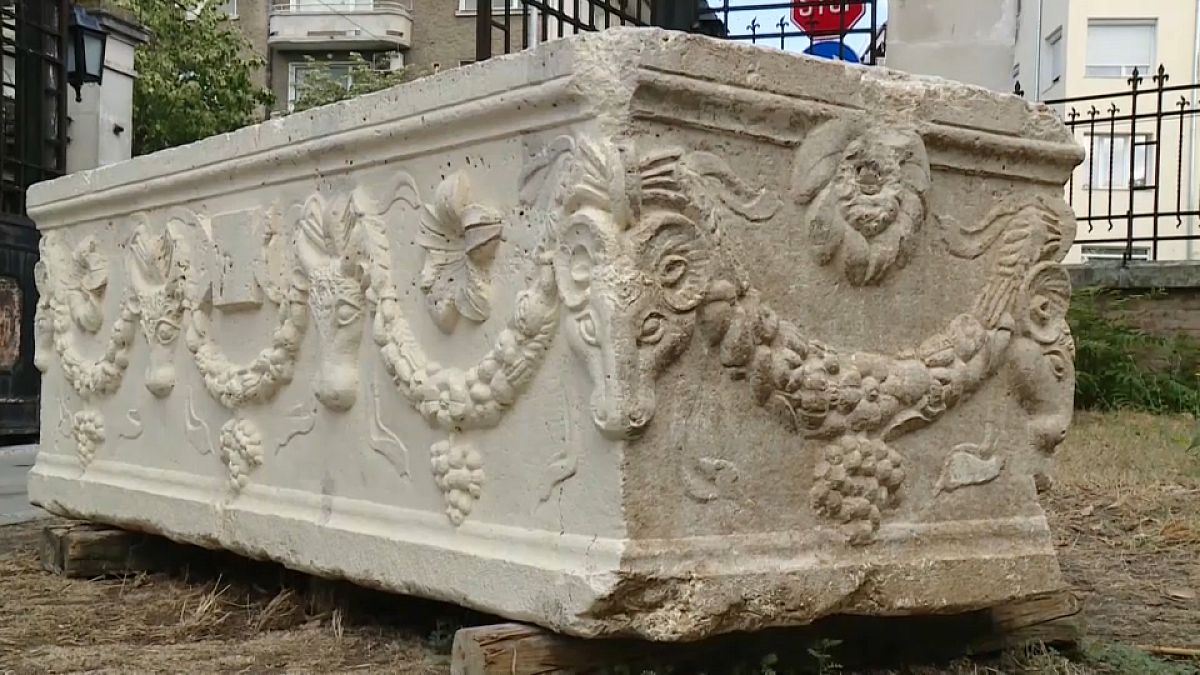A recent discovery of an ancient Roman sarcophagus on a beach near Varna in the Black Sea has sparked concerns about the preservation of Bulgaria’s cultural heritage. The sarcophagus, believed to date back to Roman times, was found to be made from shelly limestone and adorned with intricate relief decorations depicting garlands, animal heads, rosettes, and a labrys. Despite its historical significance, the sarcophagus was being used as a bar at a popular beach club, prompting calls for an investigation into how it ended up there.
Archaeologist Alexander Minchev emphasized that all archaeological artifacts legally belong to the state, regardless of where they are found. He raised the alarm about the improper use of such valuable historical items and urged authorities to take action to ensure their proper preservation. The discovery of the sarcophagus came to light when a former police officer spotted it on the beach during a holiday in Varna, leading to a pre-trial investigation by the Varna District Prosecutor’s Office.
With assistance from the Interior Ministry, the ancient sarcophagus was carefully removed from the beach and transported to the Varna Archaeological Museum for further examination. The move was part of efforts to protect and preserve Bulgaria’s rich cultural heritage and ensure that such important artifacts are properly stored and displayed. The case has sparked a broader conversation about the need for better safeguarding measures for archaeological treasures in Bulgaria and the importance of raising awareness about their significance.
The use of the Roman sarcophagus as a bar at a beach club has raised questions about the lack of awareness and respect for Bulgaria’s cultural heritage. The incident serves as a reminder of the importance of protecting and preserving historical artifacts for future generations. It has also brought attention to the need for stricter regulations and enforcement to prevent the unauthorized use and exploitation of archaeological treasures in the country. Authorities have been urged to take swift action to investigate the origin of the sarcophagus and ensure that similar incidents are prevented in the future.
The discovery of the ancient sarcophagus on the beach near Varna has highlighted the challenges faced in preserving Bulgaria’s cultural heritage. The incident has underscored the need for greater awareness and education about the significance of archaeological artifacts and the importance of their proper care and protection. Efforts are being made to address the mishandling of historical treasures and to implement measures to ensure their conservation and safekeeping. By raising awareness about the value of Bulgaria’s cultural heritage, steps can be taken to prevent such incidents from reoccurring and to promote the appreciation of the country’s rich history and heritage.
In conclusion, the discovery of the Roman sarcophagus on the beach near Varna has reignited discussions about the preservation of Bulgaria’s cultural heritage and the need to protect archaeological treasures. The incident has shed light on the challenges faced in safeguarding historical artifacts and the importance of raising awareness about their value. By taking action to investigate the origin of the sarcophagus and enforce stricter regulations, authorities can ensure that such priceless relics are properly cared for and respected. Efforts are underway to promote the preservation of Bulgaria’s rich history and heritage for future generations to appreciate and learn from.










